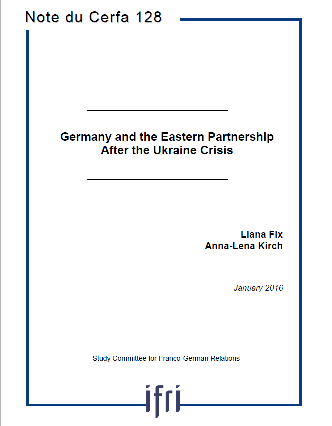Germany and the Eastern Partnership after the Ukraine Crisis

The conflict in and about Ukraine has catapulted the European Union's Eastern Partnership (EaP) into the limelight of international attention. Belittled as a bureaucratic and technical policy instrument, the European Neighbourhood Policy and the EaP as its Eastern regional dimension have within the course of a few months gained unexpected geopolitical significance.
By the same token, Germany – initially reluctant to be at the forefront of the Eastern Partnership initiative – has found itself at the centre of crisis-management efforts in Ukraine. This has, however, not resulted in a change of Germany's general position towards the EaP with regard to a possible membership perspective for the most advanced countries. For Germany, the EaP remains a tool of Ordnungspolitik – projecting order in the neighbourhood – and not a pre-accession instrument.
The 2015 ENP review reflects Germany’s position: It offers no indication of a possible membership perspective and only limited additional incentives for the associated countries Ukraine, Georgia and Moldova. From a German perspective, EU support should focus more on strengthening conditionality to avoid a backsliding in associated countries and less on additional financial incentives or cooperation formats. Despite the conflict in Ukraine, Germany remains convinced that stabilisation in the neighbourhood can only be achieved with and not against Russia.
Whether this approach is sufficient to drive the transformation process and provide stability in the neighbourhood, given Russia's increasing assertiveness, remains to be seen. For non-associated countries (Armenia, Belarus and Azerbaijan), the transformative aspirations of the ENP were given up for a more pragmatic and transactional approach: differentiated cooperation offers these countries a new channel to engage with the EU beyond Association Agreements/Deep and Comprehensive Free Trade Areas (DCFTAs). For Ukraine, the test for German leadership beyond crisis management will be what more Germany can do if Minsk II is not implemented and the conflict in Eastern Ukraine becomes yet another protracted and unresolved conflict in the neighbourhood.
Liana Fix is a fellow at the Eastern Europe and Eurasia research division of the German Institute for International and Security Affairs (SWP).
Anna-Lena Kirch is a research assistant at the Europe Program of the German Marshall Fund of the United States (GMF),
This content is also available in French.

Available in:
Regions and themes
ISBN / ISSN
Share
Download the full analysis
This page contains only a summary of our work. If you would like to have access to all the information from our research on the subject, you can download the full version in PDF format.
Germany and the Eastern Partnership after the Ukraine Crisis
Related centers and programs
Discover our other research centers and programsFind out more
Discover all our analysesMerz’ European Policy-making: The End of the ‘German Vote’?
Friedrich Merz’s European ambition is to turn Germany, long seen as hesitant into a leading actor within the European Union (EU). To that end, he has pledged to end the “German vote,” a phenomenon that epitomizes the paradox of a country both indispensable and frequently absent from European decision-making.

Securing critical raw material (CRM) value chains – a prerequisite for Europe’s technological resilience
At the heart of economic security, technological resilience is a backbone of the European Union’s (EU) competitiveness. The EU’s energy and digital transitions depend on critical raw materials (CRM).

Reconciling competitiveness and demographic change: a Franco-German imperative
France and Germany are facing parallel demographic shifts that could reshape the future of their economies and their social models. These shifts reflect broader European patterns but are magnified by the central role both nations play in EU governance and competitiveness.
Taking the Pulse: Does France's Political Crisis Weaken Europe's Geopolitical Hand?
While the EU tries to navigate a myriad international challenges, France is experiencing historic political disarray. What impact will instability in Paris have on Europe's geostrategic capacity?








